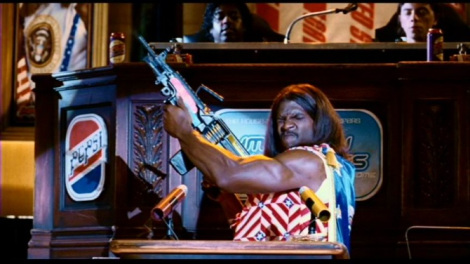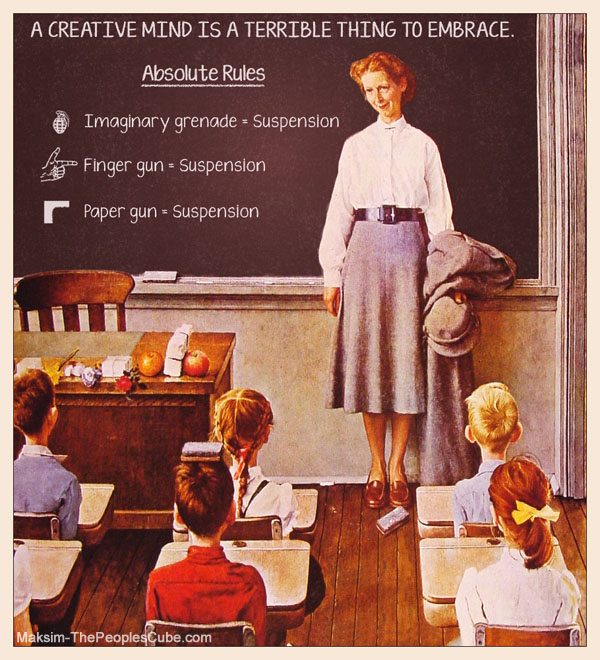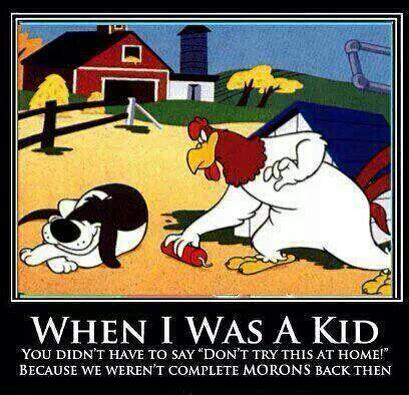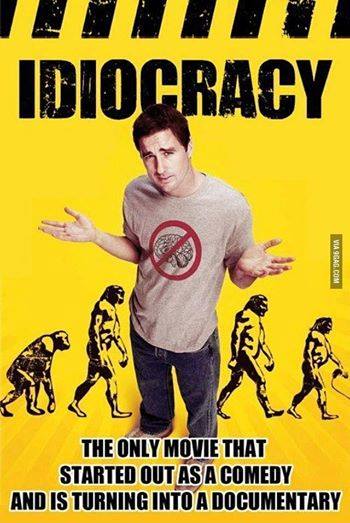
 | The Xenophile Historian |
THE HOLY BOOK OF UNIVERSAL TRUTHS,
K. U. P.
(Kimball's Unauthorized Perversion)


Now in the wild, there is no reward for acting stupid; normally when you do, you wonít live to tell about it. At best you become a warning to others, not to do the same thing. Along that line, you may have heard that you should never stand next to somebody shouting, "Hey yíall, watch this!", because that will probably be the last thing he will ever say. That is why we find the Darwin Awards funny; we all know the winners are examples of natural selection in action!
For most of history, we know natural selection was working because life was "poor, nasty, brutish and short," as Thomas Hobbes put it. I was reminded of that when I saw Mel Gibsonís Apocalypto; the main thing I got out of the movie was that ancient Mesoamerica had an awful lot of ways to die. Western Europe started to climb out of that death-trap in the second half of the seventeenth century -- right when Hobbes was alive. First, Europeans found fewer reasons to fight, reducing the number of violent deaths. In this case, the Thirty Years War made such a mess of Germany that Catholics and Protestants agreed they would no longer fight each other because they thought God wanted it.
Of course there were some big conflicts later on, like the Napoleonic Wars and two World Wars, but they caused so much destruction that they also increased the desire for peace, thus contributing to the antiwar trend. And since World War II, the number of combat-related deaths has gone down, largely because of improved medicine and modern body armor. For example, the number of US servicemen killed in Afghanistan and Iraq combined is 6,717. Of course these deaths are tragic, but 150 years earlier, a Civil War battle could (and did) kill more soldiers in a single day. In addition, the number of deaths from violent crime and executions is down, too; one could make the case that we are in the most peaceful era in history. To sum it up, the chance a person has of suffering a violent death has gone down. Way down.
Meanwhile, advances in technology and medicine have allowed people in less than perfect physical condition to live normally (more or less), and reduced the number of deaths from diseases. When Western Civilization spread to the rest of the world, the number of short, wasted lives was reduced there, too. Todayís civilization can now choose who will leave the most descendants; you could say that natural selection has disappeared, and unnatural selection has taken its place.
Because of the disappearance of natural selection for humans, one of the scariest places to live in the modern world is Africa, where natural selection is still active. Here is what I wrote about that, in my African history series. Quote:
"Life in Africa is cheap, to a degree that Europe hasn't seen since the end of the Thirty Years War. For a start, Africa provides so many Ďnaturalí ways to die: wild animals (e.g., crocodiles, lions, sharks, poisonous snakes and insects), parasites, bad food, no food at all, and so on. Add manmade causes like violent crime, war, and the various atrocities that come when governments ignore human rights and the rule of law. Top that off with epidemics like AIDS, and you'll get an idea why Africa's life expectancy, after rising for most of the twentieth century, has fallen in recent years; the overall life expectancy for the continent is now just fifty years.
"Kim du Toit, a blogger who lived in South Africa for thirty years, used this story to explain Africa's casual attitude toward death:
"ĎMy favorite African story actually happened after I left the country. An American executive took a job over there, and on his very first day, the newspaper headlines read: Three Headless Bodies Found.
The next day: Three Heads Found.
The third day: Heads Don't Match Bodies.'"(55)
Unquote: Donít get me wrong, I am for modern medicine, technology and peace. I am a civilized person, after all. If I wanted to do away with those things to promote natural selection, you would probably call me a creep, and I would deserve it. But it becomes a different matter when politics plays the role that natural selection used to play, which is what I am going to talk about next.
To start with, there is the so-called "dumbing down of education." It is no secret that the quality of education in the United States has been declining for a long time. Children from public schools (or government schools, as the retired talk show host Neal Boortz called them) consistently fail when competing against children from private schools, homeschools, and foreign schools. Test standards have been lowered so that fewer students fail, the result being that they get into high school barely able to read, and with rudimentary math skills. In place of what they used to learn, there is an emphasis on maintaining the studentís self-esteem, and they are taught politically correct subjects. For example, American history and Western civilization are dismissed as a bunch of stories about "dead white males," and are likely to be replaced by womenís history and African-American history. And because it is now possible to go through four years of college without learning much that is useful, a college degree is worth less than it used to be. No wonder a 1983 report on the state of US education opened by declaring, "If an unfriendly foreign power had attempted to impose on America the mediocre educational performance that exists today, we might well have viewed it as an act of war."
Some conspiracy theorists have suggested that the dumbing down was done on purpose, to teach future generations to accept authoritarian rule. Whether or not they are right, the result is the same; todayís students are taught that "great minds think alike," instead of "great minds think for themselves."
Special mention should be given to "zero tolerance" policies. Originally these were used to get drugs out of the workplace, or to make sure people didn't drink alcohol while driving. When applied to school issues, however, they allowed faculty members to act without thinking, leading to idiotic results. I remember a news story back in 1993 where a six-year-old boy kissed a girl in his class and was accused of sexual harassment, and other stories about how plastic knives in lunchboxes and inch-long toy guns were seen as violations of rules against bringing weapons to school. I am writing this just a month after the tragic mass shooting at an elementary school in Newtown, Connecticut, and already since then, there have been two cases where small children were suspended from class because they pointed fingers at each other, pretending to have guns. What message does it send to our students, when they see those in authority enforce rules and not think about the consequences? Or maybe I should put it this way: How many times can someone act stupid, before he becomes stupid?
"I'd rather entrust the government of the United States to the first 400 people listed in the Boston telephone directory than to the faculty of Harvard University." -- William F. Buckley, Jr.



I'm not the only one to notice the dumbing-down trend. I'm not even the first; in 2009 The Boston Globe wrote a column that called those 30 years old and younger the "dumbest generation." The column is no longer on the Globe's website, so as a summary, here are the eight reasons cited by the author:
Yikes! According to Peter McAllister, the author of Manthropology, we are both weaker and dumber than our ancestors. If through some form of time travel we could meet those who lived before us, and we didn't have our prescription drugs, eyeglasses and other physical aids, or fancy gadgets, we'd have no advantage over them; in any physical or intellectual contest, they would win. In that sense we are not evolving, but devolving. This goes a long way towards explaining some of the stupid things in modern-day society, from the lottery to the immature politicians we keep on electing.

Support this site!